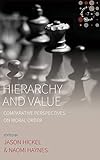Hierarchy and Value : Comparative Perspectives on Moral Order / ed. by Naomi Haynes, Jason Hickel.
Material type: TextSeries: Studies in Social Analysis ; 7Publisher: New York ; Oxford : Berghahn Books, [2018]Copyright date: ©2018Description: 1 online resource (170 p.)Content type:
TextSeries: Studies in Social Analysis ; 7Publisher: New York ; Oxford : Berghahn Books, [2018]Copyright date: ©2018Description: 1 online resource (170 p.)Content type: - 9781785339967
- 9781785339981
- 302.35 23
- HM706 .H54 2018
- online - DeGruyter
| Item type | Current library | Call number | URL | Status | Notes | Barcode | |
|---|---|---|---|---|---|---|---|
 eBook
eBook
|
Biblioteca "Angelicum" Pont. Univ. S.Tommaso d'Aquino Nuvola online | online - DeGruyter (Browse shelf(Opens below)) | Online access | Not for loan (Accesso limitato) | Accesso per gli utenti autorizzati / Access for authorized users | (dgr)9781785339981 |
Frontmatter -- Contents -- Acknowledgments -- Preface: Toward a Political Anthropology of Hierarchy -- Introduction: Hierarchy and Value -- Chapter 1 Battle of Cosmologies: The Catholic Church, Adat, and ‘Inculturation’ among Northern Lio, Indonesia -- Chapter 2 Vertical Love: Forms of Submission and Top-Down Power in Orthodox Ethiopia -- Chapter 3 The Good, the Bad, and the Dead: The Place of Destruction in the Organization of Social Life, Which Means Hierarchy -- Chapter 4 Civilization, Hierarchy, and Political-Economic Inequality -- Chapter 5 Islam and Pious Sociality: The Ethics of Hierarchy in the Tablighi Jamaat in Pakistan -- Chapter 6 Demotion as Value: Rank Infraction among the Ngadha in Flores, Indonesia -- Afterword: The Rise of Hierarchy -- Index
restricted access online access with authorization star
http://purl.org/coar/access_right/c_16ec
Globalization promised to bring about a golden age of liberal individualism, breaking down hierarchies of kinship, caste, and gender around the world and freeing people to express their true, authentic agency. But in some places globalization has spurred the emergence of new forms of hierarchy—or the reemergence of old forms—as people try to reconstitute an imagined past of stable moral order. This is evident from the Islamic revival in the Middle East to visions of the 1950s family among conservatives in the United States. Why does this happen and how do we make sense of this phenomenon? Why do some communities see hierarchy as desireable? In this book, leading anthropologists draw on insightful ethnographic case studies from around the world to address these trends. Together, they develop a theory of hierarchy that treats it both as a relational form and a framework for organizing ideas about the social good.
Mode of access: Internet via World Wide Web.
In English.
Description based on online resource; title from PDF title page (publisher's Web site, viewed 25. Jun 2024)


